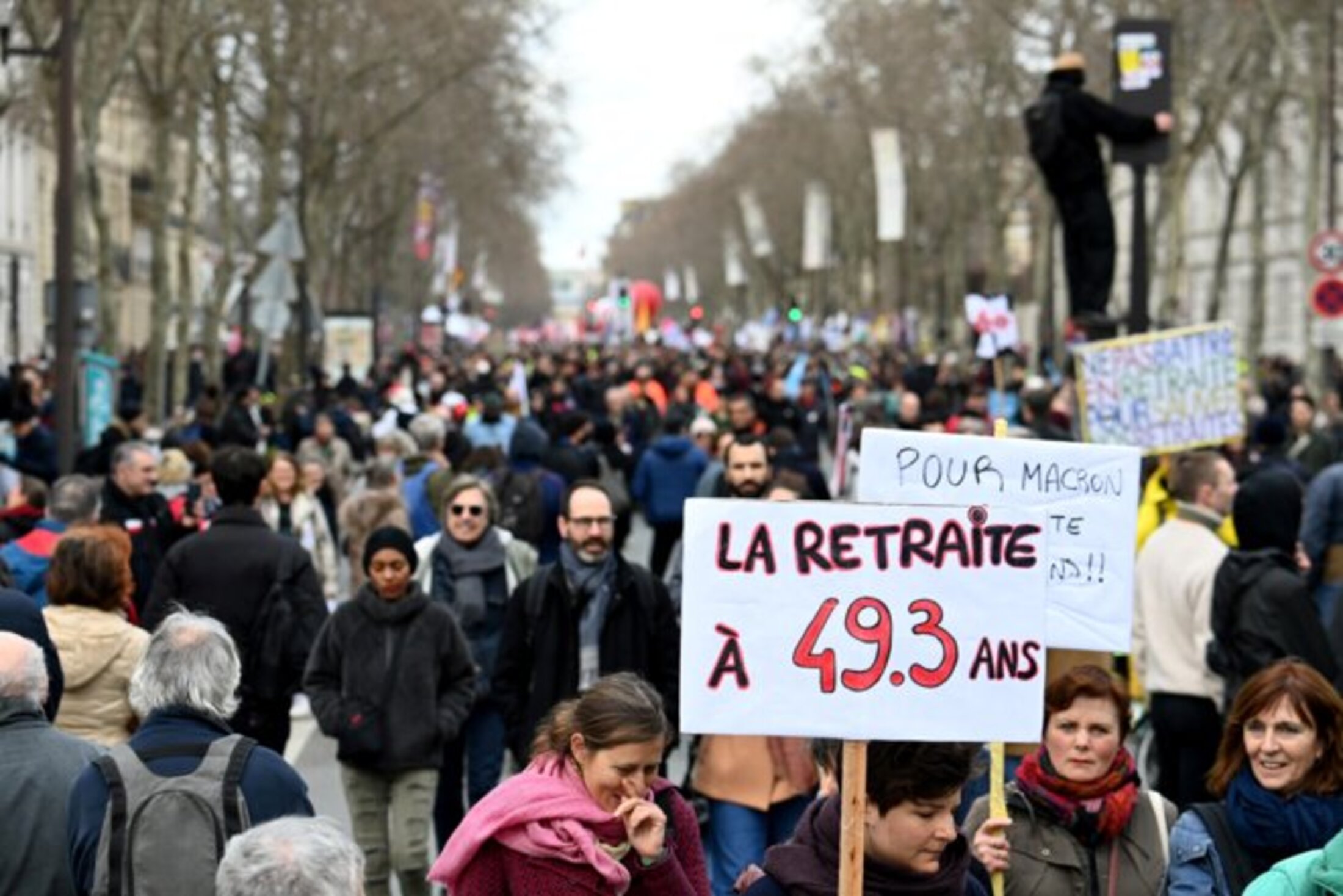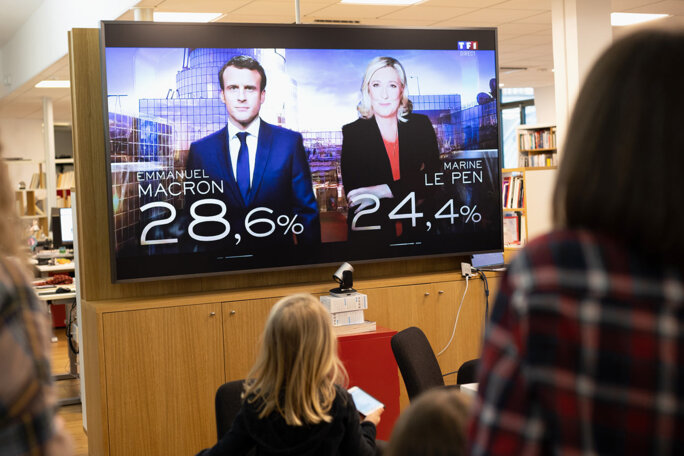Ever since the beginning of the protest movement against Emmanuel Macron’s proposed reform of the pension system, he, his government and their allies have insisted that the measure was at the heart of his manifesto during his re-election campaign last year, and was therefore supported by a majority of voters.
The implication is that those now opposed to his reforms, despite the vast turnout in demonstrations and marches across the country, are bad losers, stubbornly resistant to change, seditious even, who fail to respect the rules of democracy.
“During the elections, things were said clearly, the reform was presented democratically and validated,” Macron declared on January 19th 2023, the day of massive nationwide protests against his reform, when turnout was estimated at between 1 and 2 million. But, as Mediapart has discovered in a study of his 2022 election campaign accounts, Macron knows very well, perhaps better than anyone, that his claim of “validation” is misleading, as was confirmed by opinion surveys commissioned at the time of his campaign.

Enlargement : Illustration 1

The details of those opinion surveys are contained in the campaign accounts published online on March 13th by the election watchdog, the National Commission for Campaign Accounts, (CNCCFP). All of the accounts of the 2022 election candidates are, and for the first time, available for consultation online following their validation by the CNCCFP at the end of January.
In the case of Macron, the accounts show that during his re-election bid last year he spent 325,000 euros on opinion surveys (compared to 200,000 euros spent on opinion polling during his first election campaign in 2017). That was more than three times the amount spent on opinion surveys by far-right candidate Marine Le Pen, who reached the final, second-round playoff with Macron (while radical-left candidate Jean-Luc Mélenchon, who came third behind Le Pen in the first round of voting, spent no money on opinion polls in the runup to the elections according to his campaign accounts).
Macron’s campaign team commissioned surveys from a number of pollsters, including some of the biggest in France; Ipsos (which was paid a total of 161, 000 euros), Ifop, Kantar, Harris interactive, and Dassault Systèmes.
In a “qualitative analysis” report by Ifop into the “reasons for a preference for Emmanuel Macron or Marine Le Pen”, it set out clearly that if the prospect of Macron’s re-election was strong, it was not because of support for his manifesto but was instead a reaction against the far-right. Delivered to Macron’s campaign managers in early April 2022, just a week before the first round of voting, the report concluded that, in the case of a second-round dual between Macron and Le Pen, support for Macron “depends very little on an eventual ‘political project’ (with the exception of a few minor associations with the pensions reform or the European union)”.
The report noted that, “to caricature a little bit”, Macron appeared to be regarded as having the role of “a ‘pure manager’ or ‘administrator’ […], or more exactly that of a ‘rampart’ in face of the major disorders that threaten the country”. It concluded that “the declared preference for Emmanuel Macron is above all explained by an instinctive rejection of Marine Le Pen who remains for many a repulsive and worrying political option”.
That observation reflects a widely held opinion, notably on the Left, that Macron’s election in 2022, as in 2017 when he also faced Le Pen in the final round, was in no small part due to a cross-party vote to prevent Le Pen from taking power and did not reflect the true extent of support for his political programme.
“I know also that a number of our compatriots have voted for me today, not to support the ideas that I espouse but to act as a barrier to those of the far-right,” declared Macron, speaking at the Champ-de-Mars park in central Paris on the evening of the second and final round of voting, on April 24th 2022. “I am conscious that this vote obliges me for the years to come. I am the guardian of their sense of duty, of their attachment to the [French] republic, and of a respect for the differences that were expressed these past weeks.” However, with the end of the elections, such pledges vaporised and the story of the election would become re-written by the re-elected president.
Macron’s campaign accounts reveal that in September 2021, the Ipsos polling and market research group delivered to his campaign team the results of a survey of 1,500 registered voters. Included in the findings were that a good half of those questioned called for “the abandonment” of Macron’s then planned hike of the age of retirement on a full pension to 65 (now reduced to 64). The only age group among those polled who were by a majority in favour of the move were those “aged 70 or more”. In an analysis by profession, all active categories, even those in managerial posts, were for the most part against the proposed reform, and only those who were retired were mostly in favour.
In February 2022, two months before the presidential elections, Macron’s campaign staff were given the results of an opinion survey commissioned from Kantar. That poll also questioned 1,500 registered voters, this time about what they regarded as priority issues for the next five-year presidential term. For a large majority these were questions relating to economic matters and, included in that domain, a reform of the pension system was a priority issue for just 1% of those polled. Meanwhile, an increase in purchasing power was a priority for 33%.

Enlargement : Illustration 2

Kantar also carried out an opinion survey in between the two rounds of last year’s election, held on April 10th and April 24th. This targeted voters who had not chosen Macron in the first round, but who were from an electoral category which the pollster defined as necessary for Macron to win over in order to beat Le Pen in the second round. That survey found that pushing back the retirement age to 65 “does not convince any of the voter profiles” who were questioned. The survey, which cost 22,320 euros, also reported that the “evolutions around this measure raised by the candidate during the campaign leaves the majority of the people [questioned] sceptical”.
The election campaign accounts for Marine Le Pen, candidate for the far-right Rassemblement National party (the former Front National), also detail opinion surveys commissioned for her bid. One of these was ordered in July 2021 from the firm Christophe Gervasi Marketing et Opinion at a cost of 42,000 euros (the total spending on opinion surveys for Le Pen’s campaign was 92,000 euros).
Entitled as an “Appreciation of the electoral effectiveness of different propositions”, and delivered to Le Pen’s campaign team one month later, it began with a study of the voting intentions of a group of 3,000 individuals, and their possible second choices in a final-round playoff. In a second part, the survey submitted around 50 propositions from Le Pen’s manifesto to those polled, who were divided into three separate groups of 1,000 individuals. The proposal “to guarantee the possibility of taking retirement on a full pension as of 60 years of age if one has [paid] 40 annual contributions” was judged by 72% to be economically feasible, and met with the approval of 84%.
While the measure was approved by 90% of those who said they were certain to vote for Le Pen, it was also approved by 81% of those who said they would not vote for her. The polling firm observed that the proposal to introduce a retirement age on full pension rights at 60, instead of the current 62, “poses no problem, quite the contrary, it is a powerful voting stimulant, notably in the second round”.
The French president has on regular occasions fed the media with vague murmurings of possible snap legislative elections in the cause of his reform. Centre-right Member of Parliament (MP) Charles de Courson, in an interview with French daily Le Monde, commented that if there were fresh elections, “the MPs from the presidential minority would be sent to the slaughterhouse”, adding that “dissolution is a wooden sword”. There can be little doubt that the Élysée Palace has a few opinion polls to hand which confirm that view.
-------------------------
- The original French version of this article can be found here.
English version by Graham Tearse


